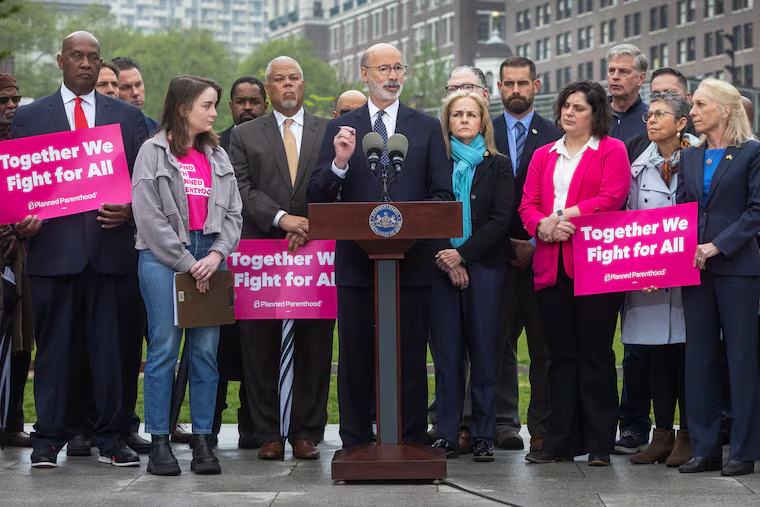Decision to overturn Roe v. Wade won’t have immediate impact on abortion law in Pennsylvania
Democratic Gov. Tom Wolf has vowed to veto any efforts to further curtail access to the procedure, but the decision further raises the stakes in the tight governor's race in Pennsylvania.

Spotlight PA is an independent, nonpartisan newsroom powered by The Philadelphia Inquirer in partnership with PennLive/The Patriot-News, TribLIVE/Pittsburgh Tribune-Review, and WITF Public Media. Sign up for our free newsletters.
HARRISBURG — The U.S. Supreme Court has struck down Roe v. Wade, the landmark 1973 ruling that established the constitutional right to abortion.
The decision effectively gives states the power to determine how, where, and why someone can get a legal abortion, if at all.
“Abortion presents a profound moral question. The Constitution does not prohibit the citizens of each State from regulating or prohibiting abortion. Roe and Casey arrogated that authority,” Justice Samuel Alito wrote in the majority opinion. “We now overrule those decisions and return that authority to the people and their elected representatives.”
It won’t have an immediate impact in Pennsylvania, where Democratic Gov. Tom Wolf has vowed to veto any efforts to further curtail access to the procedure.
But that could change as early as 2023 should state Sen. Doug Mastriano (R., Franklin) win the November election to become Pennsylvania’s next governor.
Mastriano has said he would sign a bill banning abortion at six weeks with no exceptions for rape, incest, or life of the pregnant person. His Democratic opponent, state Attorney General Josh Shaprio, supports maintaining access to abortion.
According to a May Franklin & Marshall College poll, 85% of registered voters said they support abortion being either completely legal or legal under some circumstances (which were not defined in the poll.) Only 14% of respondents said abortion should be illegal under any circumstance.
Under Pennsylvania law, abortion is legal up until 24 weeks of pregnancy. The procedure may be performed after that if the life or health of the pregnant person is in danger.
The General Assembly, long controlled by Republicans, has often backed stricter abortion laws, including a 20-week ban and proposals to ban abortion in case of an in-utero Down’s Syndrome diagnosis.
Such bills have been consistently vetoed by Wolf, a former Planned Parenthood escort and vocal ally of abortion access.
In response to the high court’s ruling, he vowed to continue to protect abortion access in the state — but he is term-limited under the state constitution from seeking reelection.
“The right to bodily autonomy — and privacy as a whole — is under attack in this country,” Wolf said. “We must do more to protect the rights of women and pregnant people in every state across the country that doesn’t have a governor willing to wield their veto pen.”
“As we approach a critical election cycle here in Pennsylvania, I cannot stress enough how important it is to exercise your personal right to vote. Elections matter.”
Friday’s U.S. Supreme Court ruling means abortion will be an even bigger issue during the November gubernatorial election, something both sides recognize.
“Whoever holds the governor’s office plays a huge role in what the legislators will do,” said state Rep. Kathy Rapp (R., Warren), the chair of the House Pro-Life Caucus.
Rapp added that she and her allies who oppose abortion access “have a lot of options” and “have not settled on one piece of legislation at this time.”
In a statement Friday, Mastriano said Roe vs. Wade had been “rightly relegated to the ash heap of history.”
“As the abortion debate returns to the states, Pennsylvania must be prepared to lead the nation in being a voice for the voiceless,” he said.
Mastriano has previously compared the push to ban abortion to the fight to abolish the slave trade in the United Kingdom. In a May statement after a draft of Alito’s opinion leaked, Mastriano called for the General Assembly to immediately vote on a six-week ban once the repeal of Roe was official.
Shapiro has echoed Wolf’s stance on defending abortion rights, saying Friday in a call that he supports Pennsylvania law as written and would “veto any bills that chip away at it.”
As for expanding access past Pennsylvania’s current law, he demurred. Any expansion, Shapiro said, would first require a Democratic-controlled General Assembly.
“We’ll cross that bridge when we come to it,” he said. “What we now know is that we are in a position where bill after bill taking away these fundamental freedoms [are] making its way to Governor Wolf’s desk and likely making its way to my desk.”
Lawmakers opposed to abortion access have also proposed a state constitutional amendment stating “the policy of Pennsylvania is to protect the life of every unborn child from conception to birth, to the extent permitted by the Federal Constitution.”
The governor plays no role in the lengthy amendment process. Instead, the legislature must pass an amendment in two consecutive sessions, before it goes in front of voters in a referendum for final approval.
The proposed amendment is currently awaiting a final vote before the state Senate. The earliest it could reach voters would be spring 2023.
In a press conference Friday, advocates for abortion access said that if the amendment became law, it would open the door to restrictions not just on abortion but also birth control and other reproductive health care procedures.
“Make no mistake, this is just the beginning of a very long fight,” said Signe Espinoza, the executive director of Planned Parenthood PA Advocates. “But the court is outnumbered. We will keep fighting and this will not stop us.”
WHILE YOU’RE HERE... If you learned something from this story, pay it forward and become a member of Spotlight PA so someone else can in the future at spotlightpa.org/donate. Spotlight PA is funded by foundations and readers like you who are committed to accountability journalism that gets results.